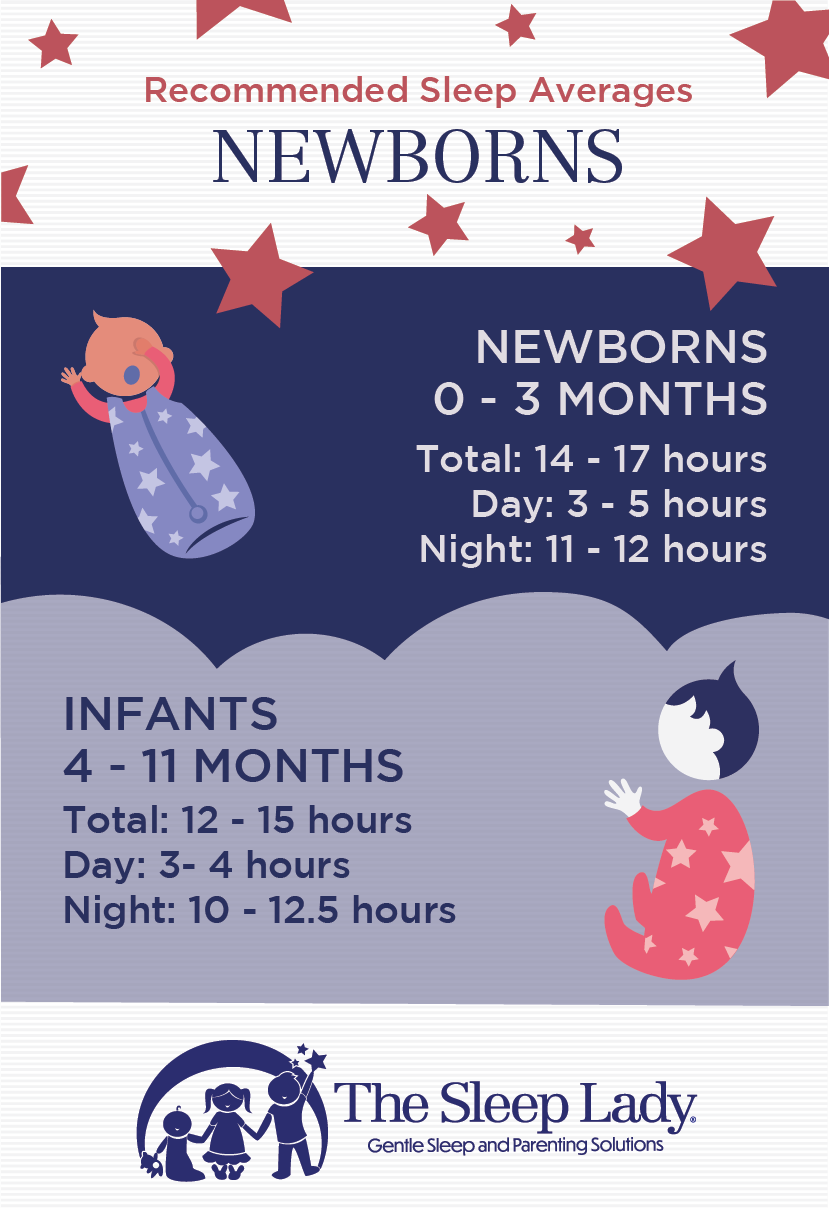Newborn Sleep Schedule: What You Can Do for Some Sleep
For anyone looking for the answer to the question, “What does a newborn sleep schedule look like?” The answer is simple: There isn’t such a thing as a “normal” newborn sleep schedule. That’s probably not the answer you were hoping for, but you may find it helpful to learn a little bit more about what goes on with your baby’s sleep from birth until three months old. Explore:
- Brain development
- The nature of newborn sleep
- You CAN cuddle your newborn to sleep
- Day/night confusion
Brain Development
According to Psychology Today, “Human babies, unlike any other creature, have only 25% of the brain developed at birth (assuming 40-42 weeks’ gestation at birth, i.e., full term).” Babies will sleep a lot — on average between 14 and 17 hours in 24 hours in the first three months. Their sleep is purposeful — it’s for healthy brain development to take place. Remember, this world is very new to them, and they are taking it all in.
The Nature of the Newborn Sleep Schedule
In the first 12 weeks of life, most infants go through short sleep and wake cycles that are usually spread out evenly throughout the day and night. You may see longer periods at night, however your baby may take longer for those nighttime sleep stretches to develop.
Babies this young wake frequently as a survival skill because they are signaling a need. They also move around and make noises while sleeping. They may be too hot, too cold, hungry, ill, or just generally uncomfortable. Eventually as they get closer to six months, babies sleep more soundly. You should respond to your newborn quickly so he’ll settle faster.
Cuddles to Sleep
Very young babies need their parents to cuddle and comfort them. At this point in their development, they don’t have the means to do it themselves. They may need you to help replicate the warm and cozy feeling they felt when they were in the womb so that they may feel secure and fall asleep.
Take advantage of this time to bond with your baby so he can grow and thrive. Relax, knowing that at this young age you will not teach your child any “bad habits” by snuggling them to sleep.
Ready for the next step? Learn about the 4-month sleep regression:
Read: 4 Month Sleep Regression – Tips To Soothe Your Baby
Day/ Night Confusion
A newborn sleep schedule is based on the baby’s internal clock, or circadian rhythm. This doesn’t develop until around 3-4 months of age. As a result, they may do longer stretches in the daytime and shorter stretches at night. This is because newborn babies do not fully produce the sleep hormone, melatonin, that makes us feel tired and regulates our internal clocks. Melatonin secretion is triggered in the brain with darkness and is suppressed with light.
You can help your little one regulate their internal clock by exposing them to regular daytime activities that include light, noise and fresh air. You may also consider waking your baby during the day for regular feedings. Encourage daytime naps to keep your baby from being over-tired — a newborn sleeps from 14-17 hours a day, so several of those hours will come from daytime sleep.
Learn more about daytime sleep and naps:
Read: Naps, Naps, and Naps! When, Why, and How to Get Your Baby to Nap
In the evening, keep the house dark and quiet, and interactions short and boring. Avoid unnecessary diaper changes, and keep night time feeds quiet, boring and in dim light. Try to create a nighttime environment that is as unexciting as possible.
 Loss of Your Sleep
Loss of Your Sleep
Ok, so this one is probably blatantly — if not painfully — obvious. If this is your first baby, then reality has set in that babies do need you for everything. They eat just as frequently as everyone says. Your newborn has a tiny tummy that can only handle about 2.5-5 ounces per feed. In these very early days, he will need to feed as often as every 2-3 hours, which means that’s how often you or your partner may be waking. The experience will give you a clarified meaning of the phrase “up all night.” If you’re breastfeeding, you’ll probably find you need to feed that often to produce a good supply.
In the first few months, you may find it a little disconcerting that your baby is so unpredictable. Although there are plenty of suggestions out there that claim to lengthen newborn sleep cycles, along with a suggested newborn sleep schedule, but most don’t really produce results. Overfeeding, stretching out time between daytime feeds, or using formula or cereal to extend sleep are not backed up with any measurable evidence.
Get the sleep help your family need with one-on-one help with a certified, trained Gentle Sleep Coach.
However, you can be assured that unpredictable newborn sleep is a phase. By about three months your child’s sleep may become more predictable in its timing — until the 4month sleep regression creates a temporary upset. By around six months of age, not only will your little one be ready for a more-defined schedule, but he’ll also appreciate it.
Try to keep your sense of humor, because your fatigue will most likely result in some funny and relatable parenting stori
es. Ask anyone who’s ever poured breast milk into their coffee, or left the house wearing two different shoes.
Want to know what you can do without a consistent newborn sleep schedule?
Read “Why Newborns Wake at Night and 10 Things You Can Do About It.”
Source:
“Where Are the Happy Babies?” Psychology Today. N.p., n.d. Web. Retrieved 18 Mar. 2017.









